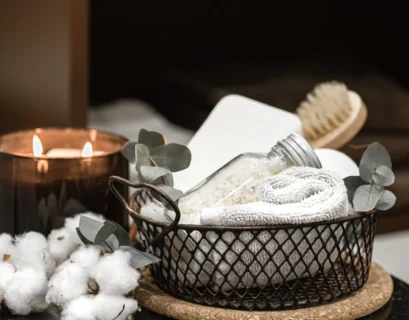Understanding the Importance of Self-Care in Relationships
In the context of long-term relationships, the practice of self-care is not merely an individual pursuit but is essential for the health and longevity of the union. Self-care for long-term relationships encompasses activities and practices that individuals engage in to nurture their mental, emotional, and physical well-being. When partners take time to invest in their own happiness, they create a strong foundation that supports the overall dynamic of the relationship. This approach allows individuals to show up as their best selves in their relationships, ensuring that each partner feels valued and respected.
The psychological benefits of self-care are profound. Engaging in activities that promote relaxation and joy can significantly reduce stress levels. When individuals in a relationship actively manage their stress through self-care, they are less likely to project frustrations and anxieties onto their partners. This reduction in negativity fosters a more harmonious environment where both partners can communicate effectively and openly. Moreover, focusing on personal well-being enhances one’s emotional resilience, leading to healthier coping mechanisms during challenging times that inevitably arise in any long-term relationship.
Emotionally, self-care allows individuals to cultivate a sense of identity and autonomy outside the relationship. Maintaining individual interests and friendships fosters a sense of fulfillment that is vital for personal growth. This individual growth contributes to a more expansive and enriching connection between partners, making their shared experiences more meaningful. As each partner thrives personally, they bring their happiness into the relationship, nurturing mutual support and understanding. Ultimately, prioritizing self-care is not an act of selfishness; rather, it is a commitment to sustaining a loving and balanced partnership over time.
Types of Self-Care Products to Consider
In the pursuit of maintaining individual happiness in long-term relationships, implementing a variety of self-care products can significantly enhance one’s mental and emotional well-being. These products fall into several categories, each serving distinct purposes that contribute to a healthy mindset and overall satisfaction.
One prominent category is skincare products, which not only improve physical appearance but also promote a sense of self-worth and care. Items such as moisturizers, serums, and face masks can facilitate a rejuvenating routine, allowing individuals to take moments for themselves amid the demands of their relationships. Engaging in these rituals fosters a deeper connection to one’s personal identity, essential for sustaining self-care for long-term relationships.
Another essential group is wellness products, which encompass items like essential oils, aromatherapy diffusers, and herbal teas. These products can create a calming environment and help alleviate stress, making them invaluable tools for individuals seeking balance in their lives. The use of calming scents and relaxation techniques can promote mindfulness, enabling individuals to better navigate emotional complexities within their partnerships.
Moreover, keeping a journal falls under the psychological self-care category. Journaling allows for the expression of thoughts and emotions, contributing to clarity regarding individual needs and aspirations. This practice not only aids personal growth but also enhances communication in relationships, thereby fortifying connections. Writing can help individuals reflect on their relationship dynamics and identify areas for improvement, ultimately promoting healthier interactions.
Lastly, relaxation aids, such as weighted blankets and guided meditation apps, support stress reduction and improve sleep quality. These tools can play a critical role in maintaining an emotional equilibrium that benefits both partners. Incorporating these various self-care products into a daily routine can significantly contribute to the stability and happiness of long-term relationships, validating the importance of personal well-being in partnership dynamics.
Skincare Products for Improved Self-Care
The significance of skincare in the realm of self-care for long-term relationships cannot be overstated. Engaging in a regular skincare routine serves not only as a means of physical maintenance but also as a powerful avenue for self-expression and self-love. When individuals prioritize their skin health, they cultivate a sense of well-being that extends beyond the surface, enhancing their overall happiness and, consequently, their relationships.
Quality cleansers are fundamental in any skincare regimen. They help to remove impurities and allow the skin to breathe. For instance, gentle cream-based cleansers can hydrate the skin while effectively cleansing, making them ideal for various skin types. A consistent cleansing practice can lead to a more radiant complexion, fostering feelings of self-worth and confidence.
Moisturizers play a pivotal role in maintaining optimal skin hydration. Products that contain natural ingredients, such as hyaluronic acid or shea butter, contribute significantly to skin elasticity and texture. By choosing a moisturizer that suits individual skin needs, one can experience a revitalized appearance. This rejuvenation not only enhances personal self-care but also boosts confidence levels, making interactions in long-term relationships more meaningful.
Another essential component is serums, which can target specific skin concerns, such as aging or dullness. Incorporating a vitamin C serum, for example, can brighten the skin and reduce signs of fatigue. Consistent use allows for gradual improvements, which can be visibly rewarding and ultimately translates into greater satisfaction in oneself. The act of selecting and applying these products showcases a commitment to personal well-being, reinforcing the concept of self-care for long-term relationships.
In summary, investing time and effort into skincare is a vital step toward self-care and personal happiness. By employing quality skincare products, individuals not only nurture their skin but also reinforce their value, ultimately enhancing their connections with others in prolonged relationships.
Mindfulness Tools and Relaxation Aids
In the pursuit of maintaining individual happiness within long-term relationships, mindfulness tools and relaxation aids play a pivotal role. These products not only enhance personal well-being but also contribute to healthier interactions between partners. One of the most popular methods for fostering mindfulness is through the use of meditation apps. These applications provide guided sessions that cater to various needs, helping individuals reduce anxiety, improve focus, and cultivate a sense of inner peace. By incorporating meditation into their daily routines, individuals can achieve a state of calm that positively influences their relationships.
Another effective mindfulness tool is essential oil diffusers. The gentle aromas of essential oils can transform any space into a serene environment, promoting tranquility and relaxation. Scents such as lavender and chamomile are particularly beneficial for reducing stress and fostering a peaceful atmosphere. By creating a soothing backdrop, individuals are better equipped to engage in self-care for long-term relationships, enhancing their emotional health and deepening their connections with their partners.
Weighted blankets are also gaining popularity as a relaxation aid. These blankets provide gentle, even pressure that can reduce anxiety and promote better sleep. The calming effects of a weighted blanket can significantly improve an individual’s emotional well-being, allowing them to wake up rejuvenated and more emotionally available for their partner. This improved state of mind is advantageous in navigating the complexities of long-term relationships.
Ultimately, integrating mindfulness tools and relaxation aids into daily routines is a vital component of self-care for long-term relationships. By prioritizing personal wellness, individuals create a foundation of happiness that enriches their partnerships, fostering love and connection over time. Embracing these products can lead to sustained happiness and healthier dynamics, reflecting the profound impact of mindful living on relationships.
Journals and Organizational Tools for Mental Clarity
In the context of nurturing self-care for long-term relationships, journaling and organizational tools play a pivotal role in enhancing an individual’s mental clarity. Engaging in regular journaling can serve as a powerful practice for self-reflection, allowing individuals to express their thoughts and feelings freely. This practice not only encourages emotional expression but also facilitates personal growth by providing insights into one’s experiences and behaviors. By documenting feelings, challenges, and triumphs, individuals can better understand their emotional landscape, leading to improved communication within their relationships.
Gratitude journals, for instance, help individuals focus on positive aspects of their lives and relationships. By regularly recording things they are thankful for, individuals can cultivate a mindset of appreciation, which significantly contributes to their overall happiness. This continuous reflection fosters a sense of contentment and encourages people to celebrate their relationships and personal milestones. Additionally, maintaining a gratitude journal can enhance resilience during challenging times, further reinforcing the importance of self-care for long-term relationships.
Furthermore, organizational tools such as planners and digital apps can support individuals in setting and managing personal goals. By clearly outlining objectives and deadlines, these tools enable a structured approach to personal development. Goal-setting is a key component of self-care, as it provides individuals with a sense of purpose and motivation. When people prioritize their personal aspirations alongside their relationships, they create a balanced environment that nurtures both self-fulfillment and partnership harmony.
Through the integration of journaling and organizational tools, individuals can monitor their emotional journey and progress while ensuring that their personal needs are met. This proactive approach contributes significantly to the maintenance of happiness within long-term relationships, aligning personal well-being with the growth of the partnership.
Fitness and Wellness Products to Boost Mood and Energy
Maintaining individual happiness within a long-term relationship relies heavily on one’s physical health, as there is a strong interconnection between physical activity and mental well-being. Engaging in regular exercise can significantly enhance mood and energy levels, which are essential for nurturing healthy and fulfilling relationships. To support this endeavor, various fitness and wellness products can prove beneficial.
Yoga mats, for instance, serve as a foundation for practicing mindfulness and improving flexibility. The act of yoga has been linked to numerous psychological benefits, including reduced stress and anxiety, which in turn can foster a more positive atmosphere within a relationship. By taking the time to focus on self-care and incorporating yoga into a regular routine, individuals can cultivate improved emotional resilience, promoting harmony and understanding in their partnerships.
Resistance bands are another practical option for enhancing physical health. These versatile tools provide an effective way to engage in strength training without requiring extensive equipment or gym memberships. Regular strength exercise not only strengthens muscles but also boosts confidence and self-esteem. This increase in self-worth can lead to healthier interactions with partners, as individuals who feel good about themselves are more likely to contribute positively to a relationship.
Fitness trackers further complement the pursuit of overall well-being. By monitoring physical activity, sleep patterns, and heart rate, these devices help individuals stay motivated and accountable in their wellness journey. Tracking progress and setting fitness goals can contribute to a sense of achievement, reinforcing a positive self-image. This sense of personal satisfaction plays a crucial role in maintaining self-care for long-term relationships, as it allows individuals to bring their best selves to their partnerships.
Implementing fitness and wellness products into one’s routine not only benefits physical health but also enhances overall happiness. As individuals prioritize their own well-being, they are better equipped to cultivate loving and lasting relationships with their partners.
The Role of Hobbies and Creative Outlets
Engaging in hobbies and creative outlets plays a significant role in the realm of self-care for long-term relationships. These activities allow individuals to cultivate personal interests that promote joy and fulfillment, which are essential for maintaining individual happiness. When individuals take time out from their daily responsibilities to pursue hobbies, they not only recharge their emotional batteries but also enhance their sense of self, making them better partners in their relationships.
Creative outlets can manifest in numerous forms, including arts and crafts, music, writing, gardening, or cooking. For instance, art supplies such as paints, brushes, and sketchbooks invite individuals to express their thoughts and ideas visually. This artistic expression can serve as an effective form of emotional release, helping to alleviate stress and foster a sense of accomplishment. Similarly, cooking tools and culinary classes elevate the experience of cooking from a chore to an enjoyable activity. Not only does cooking provide a creative platform, but it also nourishes the individual, contributing to overall well-being.
Moreover, hobbies often create a space for personal exploration and lifelong learning. Whether it’s learning to play a musical instrument, taking up photography, or participating in a book club, these pursuits encourage skill development and intellectual engagement. As individuals grow and discover new facets of themselves through these activities, they cultivate a stronger sense of identity. This strengthened identity contributes to self-care for long-term relationships, allowing partners to connect on deeper levels when they are fulfilled in their own right.
In conclusion, integrating hobbies and creative outlets into one’s routine fosters self-care that benefits both the individual and the relationship. By nurturing personal passions, individuals enhance their happiness and overall quality of life, which ultimately strengthens the bonds formed within long-term relationships.
Setting Boundaries and Prioritizing Personal Time
In the context of self-care for long-term relationships, establishing clear boundaries is essential to cultivate an atmosphere where both partners can thrive individually. Boundaries act as guidelines that define where one partner ends and the other begins, allowing each person to maintain a sense of self while being part of a couple. When boundaries are thoughtfully implemented, both partners can engage in self-care routines that promote their emotional and psychological well-being.
One effective strategy for setting boundaries involves openly communicating individual needs and expectations with your partner. It is crucial to have conversations that emphasize the importance of personal time for self-reflection, hobbies, and self-improvement. For instance, if one partner enjoys reading or engaging in a particular sport, it is vital for them to express the desire for regular time devoted to these activities. Explaining how personal time can enhance their relationship through individual growth can foster better understanding and support from the other partner.
Establishing a schedule that accommodates both partners’ individual pursuits can also be beneficial. For example, setting certain days or times dedicated to personal endeavors allows each partner to prioritize self-care effectively without infringing on the shared time necessary for nurturing the relationship. Creating this type of structure empowers both individuals to invest in their own happiness while simultaneously strengthening the partnership through mutual respect for personal space.
This balance between personal and relational needs is vital. High-quality relationships thrive on mutual support and encouragement, which are cultivated when each partner practices self-care. Therefore, when both partners recognize and respect boundaries, they can enjoy fulfilling, long-term relationships that honor individual and shared happiness.
Crafting a Personalized Self-Care Routine
Developing a personalized self-care routine is essential for maintaining individual happiness, particularly in the context of long-term relationships. It not only promotes personal well-being but also creates a positive environment that benefits both partners. To begin crafting this routine, consider your unique preferences, needs, and lifestyle. Take a moment to reflect on activities that genuinely bring you joy and relaxation, as well as products that enhance your sense of well-being. This initial introspection forms the foundation of a self-care practice tailored specifically to you.
Once you have identified your favored self-care activities, it is important to establish a schedule that incorporates them into your daily or weekly life. Consistency is crucial for any self-care routine to be effective. Setting aside dedicated time for self-care ensures that it becomes a priority rather than an afterthought. Whether it’s engaging in a calming evening ritual, enjoying a skincare routine, or practicing mindfulness, allocate time that respects your commitments while still allowing for personal rejuvenation.
Furthermore, balancing individual self-care with shared activities is essential for nurturing both personal happiness and the relationship’s overall health. Encourage your partner to pursue their own self-care activities, while also identifying opportunities for mutual experiences that can strengthen your bond. Activities like couple’s yoga, cooking healthy meals together, or exploring new hobbies can foster connection while allowing each partner to practice self-care.
Finally, recognize that self-care is an evolving process. As circumstances and individual needs change, revisit and adjust your routine as needed. This adaptability is vital in ensuring that your self-care for long-term relationships remains effective and addresses your current situation, fostering an enduring commitment to personal happiness and relationship satisfaction.













